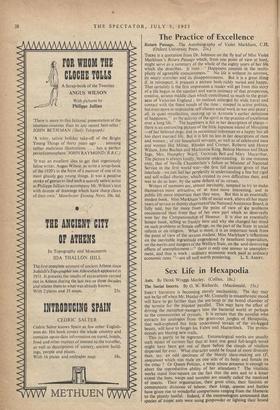The Practice of Excellence
Return Passage. The Autobiography of Violet Markham, C.H. (Oxford University Press. 21s.) Return Passage. The Autobiography of Violet Markham, C.H. (Oxford University Press. 21s.)
THERE is a quotation from Dr. Johnson on the fly leaf of Miss Violet Markham's Return Passage which, from one point of view at least, might serve as a summary of the whole of the eighty years of her life which she describes. It runs : " Happiness consists in the multi- plicity of agreeable consciousness." No life is without its sorrows, its weary stretches and its disappointments. But it is a great thing if, in retrospect, it presents a picture both richly varied and happy. That certainly is the first impression a reader will get from this story of a life begun in the comfort and warm intimacy of that pl'osperous, creative, serious middle class which contributed so much to the great- ness of Victorian England ; its outlook enlarged by wide travel and contact with the finest minds of the time ; steeped in active politics, but even more in responsible self-chosen social work in war and peace all, in quiet recollection, making up to Aristotle's earlier definition of happiness, " as the activity of the spirit in the practice of excellence over a long life." The happiness is felt in her description of places— there is an entrancing picture of the little Japanese island of Miyajima -of her beloved dogs, and in occasional references to a happy but all too short married life. But it is felt no less in her description of men and women ; of old household servants,, as well as of celebrated men and women like Milner, Rhodes and Cromer, Roberts and Henry Wilson, John Buchan and Mackenzie King, Bishop Henson and Dean Inge, Mrs. Humphry Ward, Gertrude Bell and Mary Macarthur. The picture is always kindly, because understanding. In one instance only, that of Neville Chamberlain's failure as Minister of National Service in the first world war—the first full account given of that interlude—we can feel her perplexity in understanding a fine but rigid and self-willed character, which created its own difficulties then, and was to do so later, by the same defects of its virtues.
Writers of memoirs arc, almost inevitably, tempted to try to make themselves more attractive, or at least more interesting, and in public life more important than they were. But this is an essentially modest book. Miss Markham's life of social work, above all her many years of service as deputy chairman of the National Assistance Board, is fully told, but far more from the point of view of it'le problems encountered than from that of her own part which so deservedly won her the Companionship of Honour. It is also an essentially honest book, telling us frankly how and why she changed her mind on such problems as female suffrage, on the part of the State in social reform or on religion. What is more, it is an important book from the point of view of the serious student. Miss Markham's reflections on the inevitable ingratitude engendered by beneficent imperialism, on the merits and dangers of the Welfare State, on the soul-destroying effects of unemployment—" there is only one answer to unemploy- ment, and that is work ; ordinary economic work paid at ordinary
economic rates "—are all well worth pondering. L. S. AMERY.


























































 Previous page
Previous page